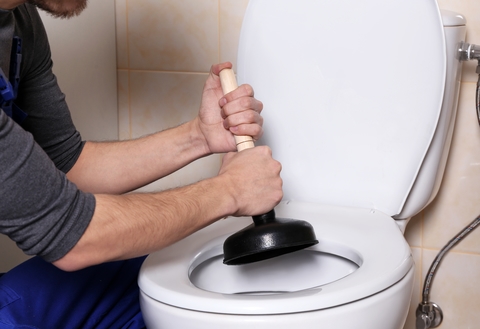How To Unclog A Slow Draining Toilet

Unclogging a slow-draining toilet may take a little more effort than clearing one that’s completely stopped up. The problem usually occurs because there’s a problem further down the line, or even in another part of the plumbing system all together.
In this article, we’ll explain:
- Possible causes for a slow-draining toilet
- Which problems you can fix yourself
- How to get rid of a bad clog
- How to avoid damaging your toilet
This is kind of a DIY guide, but just because you know how to do it yourself doesn’t mean you necessarily should.
If you’re not comfortable with your skills at any point, or if you’re unsure of what to do, don’t risk causing a major problem.
Instead, call a professional for a quick, clean repair. Down near the Jersey Shore, Broadley’s has served homes from Marmora and Upper Township down through Avalon, Ocean City, and Cape May for nearly a century.
Knowing the problem is helpful, but making it worse is not.
Click to Schedule an Appointment
That said, let’s get started.
Four Reasons Your Toilet is Draining Slowly
The most common causes for a slow-draining toilet are:
- A clog in the drain line
- A blockage between the tank and bowl
- Poor or Clogged Venting
- Damaged Flush Mechanism
We’ll deal with the clog last since that’s the one you can most likely fix on your own.
Poor or Clogged Venting
If you’ve ever been on your roof, you’ve noticed a small, open pipe up there. That’s the vent stack for your sewage. It allows air to move through your plumbing so that water can flow downwards. Without that change, it would just sit where it is.

The vent also releases gases and smells from your house. Otherwise, stenches and noxious gasses will build up inside and make you sick.
But, outside elements can clog this pipe. A bird may nest in there, or an animal might get stuck. These problems restrict airflow.
Inspecting that pipe usually isn’t feasible. But, you can look for other signs that point to this being the cause.
Are you also noticing a smell building up in the house? Is more than one toilet draining slowly? If so, the vent could be the cause.
Call a plumber if you notice these problems. You can’t tinker with the vent pipe on your own, and the gases can become health hazards.
The vent also releases gases and smells from your house. Otherwise, stenches and noxious gasses will build up inside and make you sick.
But, outside elements can clog this pipe. A bird may nest in there, or an animal might get stuck. These problems restrict airflow.
Inspecting that pipe usually isn’t feasible. But, you can look for other signs that point to this being the cause.
Are you also noticing a smell building up in the house? Is more than one toilet draining slowly? If so, the vent could be the cause.
Call a plumber if you notice these problems. You can’t tinker with the vent pipe on your own, and the gases can become health hazards.
Click to Schedule an Appointment
A Blockage Between the Tank and the Bowl
Your problem may not be between the bowl and the drain line. Instead, it could be between the tank and bowl. Pressure comes from the tank emptying one or two gallons of water suddenly, helping push what’s in the blown down the drain.
If there’s lime buildup or other blockages in the inlet hole, then the water is seeping much slower than it should into the bowl. That means less pressure and a slower draining process.
The best way to check for this problem is by watching the bowl when you flush. You should see water pouring in from the top, under the rim. If you’ve ruled out the flush mechanism, but the water’s not coming down, or if that flow is weak, you’ve likely identified the problem spot.
You can try a few fixes, but you don’t want to risk damage here. To start, turn off the water and flush, so the tank drains.
Then, gently push through the inlet hole with a stiff wire to see if you feel anything. Or, pour some white vinegar down there to help disintegrate any buildup.
Damage Flush Mechanism
Take the top off your tank and flush. If the mechanism connected to the handle that opens the flap is malfunctioning, then water may not be moving fast enough. That causes the bowl to drain slowly.

Your first point to check is the chain connecting the flap to the mechanism. If there’s too much slack, you won’t get enough action to lift the flap. Try taking out a few links or otherwise making it taut.
If the entire mechanism seems damaged, you can buy a new one at any hardware store. And, if you’re good with repairs, it’s easy enough to follow the directions and install the new one.
Now, let’s move on to the more common one: a drain line clog.
Your first point to check is the chain connecting the flap to the mechanism. If there’s too much slack, you won’t get enough action to lift the flap. Try taking out a few links or otherwise making it taut.
If the entire mechanism seems damaged, you can buy a new one at any hardware store. And, if you’re good with repairs, it’s easy enough to follow the directions and install the new one.
Now, let’s move on to the more common one: a drain line clog.
Unclogging a Slow-Draining Toilet
IF the problem is in the drain line, then an object is clogging the line, and water can’t flow freely past it. That blockage could be human waste or anything that got flushed when it shouldn’t have been: tissues, feminine products, toys, you name it.
If it’s waste or maybe even tissues or paper towels, there’s a good chance you can clear it. But, odds are you’ve already gone at it with a plunger once. If it’s further down the line, you’ll need to expand the process a little.
Hot Water and Dishwasher Soap
Warm water or dishwasher soap can help break up a large piece of waste or some other light objects. And, if you use a gallon of water at once, the pressure might move the blockage further down the line where it can then continue traveling out of the house.
Now, there are few things to watch for here.
First, do not use the hot water method with an old porcelain toilet. The sudden heat can crack the bowl, and then you’re dealing with a leak and a mess, too.
What NOT to Use
Do not use Drano or other plumber cleaner products, because they weren’t made for toilets. The chemicals in them are caustic enough to cause other damage.
So: assuming you have a newer toilet, pour a gallon of hot water down the drain. This should cause the bowl to flush on its own from the water pressure.
At that point, you can also pour some dish detergent down there, too. Then give all that stuff a little while to do its work. After that, try flushing again, and then plunging if you’re still having the problem.
In that case, the detergent and water didn’t completely eradicate the problem. But, they may have broken things up enough for you to finish the job manually.
Plumbing and Emergency Plumber Services in Cape May and Atlantic County, NJ
If your toilet is still draining slowly after that, then it’s time to call a plumber. You may have a clog further down in the drain line, or even possibly the main line for your house. In those cases, a plunger isn’t enough.
Before this becomes an emergency, call or email Broadley’s for help. We’ve served homes throughout Cape May and Atlantic counties in New Jersey for decades, and we’ll get everything running the right way as soon as possible.
